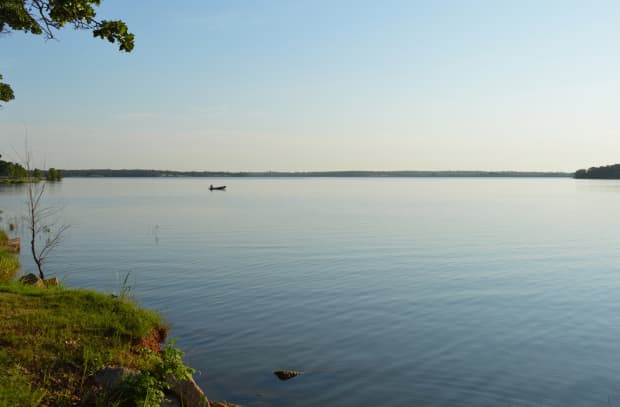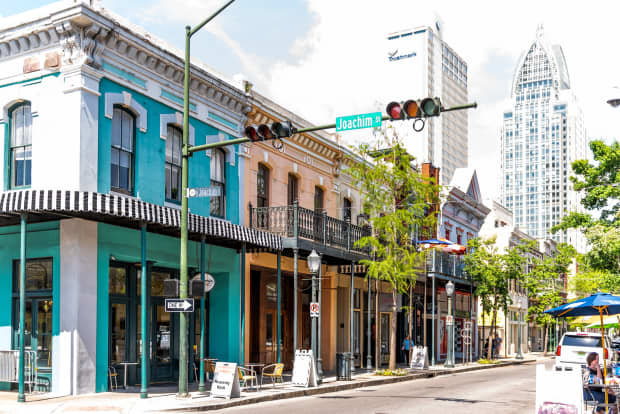This post was originally published on this site
Dear MarketWatch,
Where can I retire near water with $40,000 a year from Social Security and a pension?
I prefer a city located near a large body of water, not driving an hour. I’d prefer the ocean, but a lake will do. I don’t need beach activities, but I need the view, the feel of it.
Oh, aside from a beach atmosphere, I also need cultural activities.
I’m currently in Pittsburgh, because I worked here, but even with the three big rivers, I feel claustrophobic. I really need more sunshine and a bigger body of water.
I could afford to purchase a home for maybe $150,000.
Bountiful blessings,
Charmaine
Charmaine,
I’m glad you’re willing to consider lakes and not just oceans because you have many more options that way.
Using MarketWatch’s “where should I retire” tool, I found plenty of possibilities that have median home prices below $200,000 (our lowest category), are on the water (we define that as having a marina) and have average high temperatures in the 40s in January. I wasn’t sure what you meant by cultural activities so I used my last two “must-haves” for college town and live music.
Remember that the results show government-defined metropolitan and micropolitan statistical areas, which generally cover several counties, so you still need to look at the individual communities. Housing costs also may have shifted because of COVID and the flight to beach towns.
You may prefer other criteria. I opted not to select “below-average cost of living,” for example, becauseI figured it was covered by the housing selection. You might feel otherwise, or you might choose it as a “nice to have”. In addition, the default sorting option at the top of the results is cost of living, low to high, and is changeable.
You may want to pick a certain region of the country. You may want it warmer. You may want to set a summer temperature range, or summer humidity may be a concern.
MarketWatch defines college towns as the 131 top research universities in the country (they are in the Carnegie Classification of Institutions of Higher Education’s R1 category). You may decide you don’t need that kind of college town.
Any changes you make will get you different results.
But I understand if you have your heart set on being closer to the ocean. Then downsize your housing expectations if you are thinking of Florida — and definitely check those HOA fees if you plan to buy.
Or rent. Leave expensive home repairs to someone else.
Read: Can I afford to retire? Not before you know the answer to this big question
Please spend time in each place on your shortlist before you commit to a move and imagine what your everyday life will be. Experience the area when the weather is least pleasant. A bad move is an expensive mistake.
Here are three options to get you started. All are in states that don’t levy state income taxes on Social Security checks.
Stillwater, Oklahoma

A lone fisherman on Lake Carl Blackwell outside Stillwater, Okla.
iStockphoto
This choice might be a surprise, but the area around this college town of nearly 50,000 was among the top results on the MarketWatch “where should I retire” tool when I put in your criteria.
As I’ve written many times, I like college towns because they tend to punch above their weight in terms of amenities. Fans of the University of Oklahoma might prefer Norman, part of the Oklahoma City metro area, but Stillwater gives you the buzz of more than 24,000 students at Oklahoma State University. Senior citizens 65 and older can audit classes for free.
You’ll find plenty of water and recreational options, from the more modest Boomer Lake (250 acres) in the northern part of town to 3,350-acre Lake Carl Blackwell (operated by the university) and the 1,155 acres of Lake McMurtry to the west. Will that meet your water requirements, or is salty air more important?
Livability.com praises Stillwater’s “exciting downtown district” and says it’s “known as the home of red dirt music, a mixture of rock, country, folk and blues.”
Average winter highs are around 50 degrees; summer highs are in the lower 90s.
Should you want to visit a bigger city, Oklahoma City is an hour south, and Tulsa is an hour east.
Realtor.com, which like MarketWatch, is owned by News Corp., says the median list price for a home in March 2021 was $179,950 and calls it a buyer’s market. Here’s what the local housing market looks like, whether you buy or rent.
Other college-town suggestions courtesy of the retirement tool include the area around Fayetteville, Ark. (I suggested nearby Bentonville here), and Chattanooga, suggested here. A small-college option is Rome, Ga (suggested here), which has 30,200-acre Weiss Lake about a half-hour away.
Read: These are the 5 most affordable Caribbean islands to retire to — and 2 you should avoid
Mobile, Alabama

Old and new Mobile, Ala.
Getty Images
This city of about 190,000 people is on Mobile Bay, not on a beach — does that count as the water vibe you want? Of course, you could push south in Mobile County to be even closer to the Gulf of Mexico or even into neighboring Mississippi. But those resort towns may not have the cultural offerings you’re looking for.
In Mobile, check out the LoDa ArtWalk every second Friday in downtown and what’s on at the beautiful Saenger Theatre. You’d also have events at the University of South Alabama and could take advantage of its lifelong learning opportunities.
Average high temperatures will reach 60 in the winter and 90 in the summer.
The cost of living in Mobile County is 15% below the national average.
Mobile, like Stillwater, might seem off the beaten path, but housing costs have risen sharply over the past year. The median list price in March 2021 was $174,900. Here’s what the market looks like now, whether to buy or rent, again using Realtor.com listings.
Read: Are you worrying too much about running out of money in retirement?
Jacksonville, Florida

The Jacksonville skyline and the St. Johns River.
iStockphoto
This is a stretch option because housing costs are higher than in my other suggestions and it’s a seller’s market right now.
On the positive side, this city of more than 900,000 has 22 miles of beaches on the Atlantic Ocean, so it meets your water wish list while its size means you also have your cultural offerings. Begin your search for concerts and other performances at the Times-Union Center for the Performing Arts.
U.S. News & World Report ranks the Jacksonville area 13th among the best places to retire in the U.S. Livability notes that “historic neighborhoods serve up the charm and the street art scene keeps things interesting.” The University of North Florida is here, and state residents 60 and older can audit classes for free.
When you want nature, take the ferry across the St. John’s River north to the barrier islands and Talbot State Park.
Winters will be warmer than in Mobile, and summer highs will be similar.
Although the cost of living here is below the national average, housing costs will be an issue for you. Realtor.com says the median price of homes for sale in March 2021 was $229,000. So add the price filter to your search to see what’s in your budget. Or take a look at the rental market.
More from MarketWatch’s “Where Should I Retire” column
We want clean air and a pastoral life — where should we retire on a budget of $40,000 a year?

